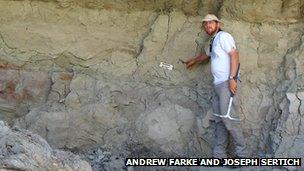Dinosaur 'fills fossil record gap'
- Published

The discovery site of the animal
Dinosaur fossils unearthed in Madagascar are of a new species that roamed the Earth about 90 million years ago, say US researchers.
The remains date back to a time when India and Madagascar were one landmass cut off from the rest of the world.
Revealing the discovery in the journal PLOS ONE, external, scientists say the dinosaur was a bi-pedal meat-eater about the size of a large cow.
It has been named Dahalokely tokana, which means "lonely small bandit".
Madagascar is a treasure trove for palaeontologists, yielding thousands of well-preserved fossils.
But the latest discovery is the first new dinosaur species unearthed on the island in almost a decade.
Its Malagasy name refers to its carnivorous diet and isolation on a landmass in the middle of the ocean.
The discovery fills a gap in the fossil record and raises intriguing questions about the evolution of animals on both Madagascar and India, which separated at about the time this newly identified creature walked the Earth.
Andrew Farke of the Raymond M Alf Museum of Paleontology in Claremont, California, says it belongs to a group called the Abelisauridae, which were common to the southern continents.
He told BBC News: "The most intriguing thing for me is that it fills a major gap in what we know about the history of dinosaurs in Madagascar.
"It shortens it by about 20 million years. It would have been a meat-eater, walking on two legs about the size of a large cow, with a tail."
Joe Sertich, curator of dinosaurs at the Denver Museum of Nature and Science, who discovered the dinosaur, said it was closely related to well-known dinosaurs from southern continents.
"This just reinforces the importance of exploring new areas around the world where undiscovered dinosaur species are still waiting."
- Published26 November 2010